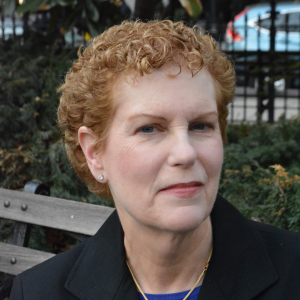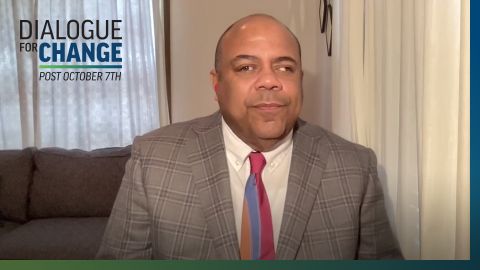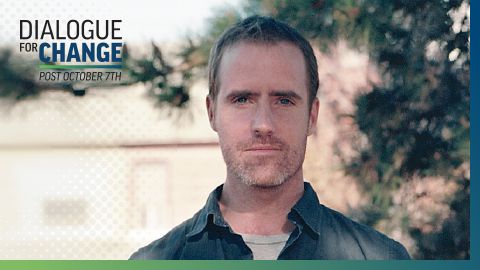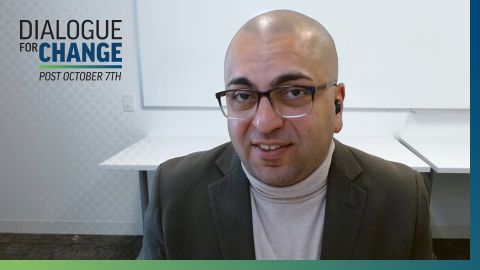Professor Pamela Nadell [00:00:00] We thought America was exceptional. And when we look at antisemitism in Europe with its horrific, state sponsored antisemitism, horrific violence that resulted in the Holocaust, that is not the American story. But that doesn’t mean that the American story was exceptional. Jews have faced antisemitism in America well before the moment we’re living.
Hari Sreenivasan [00:00:37] Professor Pamela Nadell understands the deep roots of antisemitism better than most. She is the director of the Jewish Studies Program at American University, and is currently writing a book about the history of American antisemitism. She testified three times before the House Judiciary Committee about antisemitism on campus, most recently in December 2023, alongside the presidents of Harvard and MIT. Professor Nadell is also an advisor to our series Exploring Hate. Professor Nadell, thanks so much for joining us. I know you are working on a book right now about the history of anti-Semitism in the United States. So I think it’s fair to say, you know more about this topic than most people we would speak to, I guess, really, to set our audiences, understanding a little something as basic as just the understanding of what is anti-Semitism. Might be helpful because it’s one of those phrases that gets used so often that I think people sometimes have their own idea of what that means.
Professor Pamela Nadell [00:01:43] First of all, thank you so much for having me. It’s really great to be here. And this is a really important question because scholars and politicians and people argue about what antisemitism means, and I think most people have no idea that the word was not invented until 1879. So while Jew hatred has been around for a long time, or anti, Judaism has been around for a long time, there’s something different about anti-Semitism. I would say my favorite definition of anti-Semitism, which is attributed to Isaiah Berlin, is someone who hates Jews more than absolutely necessary. However, I could define anti-Semitism in in other ways. It’s it’s about rhetoric. It’s about discrimination. It’s about conspiracy theories and hostility to Jews and includes violence.
Hari Sreenivasan [00:02:40] Antisemitism has been called the world’s oldest hatred. And it goes back to ancient times. And I wonder why is the persistence of anti-Semitism over thousands of years important to understanding today’s climate?
Professor Pamela Nadell [00:02:55] It’s critical to understanding today’s climate because many of the ideas that we associate with contemporary antisemitism are, you know, have been around for more than 2000 years. And so we can’t really understand antisemitism, either in America today or around the world without understanding the origins of those ideas.
Hari Sreenivasan [00:03:20] So give us some examples of kind of memes that we might be seeing today, and which are really just a modern incarnation of things that have been happening for hundreds of years.
Professor Pamela Nadell [00:03:33] So that I would say, you know, one of the major themes is the notion that the Jews are the enemy of Christendom. It dates to the, the Gospels, the way the Gospels portrayed the Jews as clamoring for the death of Jesus, and that therefore the Jews must be eternally punished, by the superior faith, and that the Jews remain dangerous, and therefore they have to be identified and marked out. And we we often don’t remember that those ideas are still part of attacks upon the Jews. So, for example, in October of 2022, white nationalists hung a banner over highway 405, and one of those banners referenced both, the Gospel of John and the Book of Revelation and the references. If you if you knew your your citations, you would know that there were about Jews being from the synagogue of Satan and that Jews father being the devil, so straight out of classic Christian anti Judaism.
Hari Sreenivasan [00:04:40] When when I hear of the words antisemitism, my brain flicks on and I see horrible images of the Holocaust. So I wonder what makes it so hard for Americans to grasp antisemitism. And I guess it’s Americanness.
Professor Pamela Nadell [00:04:58] Your perception is exactly the perception that I think the vast majority of Americans have. Antisemitism happened overseas. It was the Holocaust. And that’s something that happened far away in the old country and a long time ago. I think it’s really important to understand in terms of the American context, because we think America is different. We thought America was exceptional. And when we look at antisemitism in Europe, with its horrific state sponsored antisemitism, horrific violence that resulted in the Holocaust, that is not the American story, but. That doesn’t mean that the American story was exceptional. Jews have faced antisemitism in America. Well before the moment we’re living it.
Hari Sreenivasan [00:05:43] You know, I’m looking at a couple of images here. One is from the Dearborn Independent back in 1920. It looks like May. And the literally above the fold, the the headline is The International Jew calling the World’s Problem. And I wonder what was the political climate where a newspaper could print that and it’d be fine.
Professor Pamela Nadell [00:06:11] The first thing I want to say is I don’t think you know who owned that newspaper. It was Henry Ford. And for 91 weeks starting in May of 1920, he ran a series called The International Jew The World’s Problem. When he then put all of the articles into four volumes and called them the International Jew, the World’s Foremost Problem, and had them translated into more than a dozen languages and never copyrighted, so they still circulate today. Here is one of the most famous Americans, but actually it can’t. At one point, he contemplated running for president. One of America’s most famous figures, most lauded, celebrated industrialists promoting antisemitism.
Hari Sreenivasan [00:06:58] We have an image of a copy of the Protocols of the Elders of Zion being found, at the desk of a security guard who was part of the Capitol Hill police. And I wonder, for people who don’t know what that’s about. Why is that so significant in how modern conspiracies today are accelerating antisemitism in America?
Professor Pamela Nadell [00:07:24] One of the differences, that makes antisemitism unique from so many other forms of hate is the notion of these conspiracy theories, the idea that the Jews are actually secretly powerful. That they have, across the millennia, economically and politically manipulated governments. And the protocols of the Elders of Zion is in many ways the most famous of the antisemitic conspiracy theory texts. It was crafted in 1903, in Russia, and it began to circulate widely around the world after the Bolshevik Revolution of 1917. And Henry Ford, when he published The International Jew in the Dearborn Independent, he published excerpts of The Protocols of the Elders of Zion. And so we’re seeing it again in the 21st century, displayed on the desk of a police officer who works at the US Capitol.
Hari Sreenivasan [00:08:24] When you track where and how anti-Semitism rears its head, were there spikes in it in American history?
Professor Pamela Nadell [00:08:34] The spike of the 1920s through 30s through 40s, that period in between the two wars, there’s a major, major spike. We had a significant moment of antisemitism in America that in many ways, I think parallels what’s going on today. Historians have called that period the high tide of American antisemitism. I have been wondering for the past several years if we are actually living through the high tide of American antisemitism now, and we’ll have to change what we call that earlier period.
Hari Sreenivasan [00:09:12] How have Jewish historians approached what’s been happening in America?
Professor Pamela Nadell [00:09:19] Well, that’s that’s such an interesting question, because, you know, as historians, we live in our moment in time. So in the year 2000, when antisemitism really seemed to have gone completely underground, a historian wrote a book called The Death of American Antisemitism. And of course, now that seems ludicrous. The conversations that I have had with members of the Jewish community since October 7th. Almost every single conversation begins with, I never thought I would live in a moment like this. I never thought this would happen in my lifetime in America.
Hari Sreenivasan [00:09:53] You know, we often think of antisemitism coming primarily from the far right. The white supremacists, the Proud Boys and so forth. But he’s there a distinction in your mind of when it comes from a different part of the political spectrum, whether it’s far left or elsewhere?
Professor Pamela Nadell [00:10:16] Well, I think you’re absolutely right. I mean, what we what we had seen, especially since the Unite the Right rally in Charlottesville and then the murders at the Tree of Life synagogue in October of 2018, and events that have happened since then is that these violent outbreaks of antisemitism are often coming from sometimes from group actors, sometimes from lone actors, and they’re coming from the right. But we are living in a moment where antisemitism is also simultaneously exploding on the left. And it’s not new. It’s the consequences of decades of language and rhetoric that presents the Jews as settlers, colonialists, as white nationalists, as privileged racists, and that we were now just seeing that surging. And it’s why I think the moment that Jews are living in maybe the real high tide of American anti-Semitism, because Jews are getting attacked from both the right and the left. Well, right now, where we all.
Hari Sreenivasan [00:11:20] After October 7th. Has anything surprised you?
Professor Pamela Nadell [00:11:25] What surprised me was the outburst in one way. I mean, another way. It’s been building for a long time. But what really stood out is the extent of the vehemence against Israel. And that ultimately spilled over into antisemitism against Jews on college campuses, but also, frankly, across America and around the world.
Hari Sreenivasan [00:11:51] There is a history of anti-Semitism on college campuses, but I’m wondering how, if at all, have the events after October 7th been different?
Professor Pamela Nadell [00:12:07] They have absolutely been different. They’ve been different. First of all, because of the level of the explosion of vitriol, sometimes they use the language that the, the, the protest will be about Zionist. But Zionist in that sense is the code word for Jew. But other times the language has veered to the kinds of things that Henry Ford was comfortable publishing in the 1920s. So we have absolutely seen the sewer covers taken off of, antisemitism. And it’s just exploded, especially since October 7th on campuses.
Hari Sreenivasan [00:12:47] Why do you think that the Israeli-Palestinian conflict is such a flashpoint? And what role, if any, does anti-Semitism play into that?
Professor Pamela Nadell [00:13:00] It’s a huge flashpoint because campuses have been and campuses are primarily, places where politically people are are centered, are there on the left, and the left has embraced the underdog, and the underdog clearly is the Palestinian cause. And so this has been, you know, kind of like a toxic stew in terms of, in terms of the campus. And there’s no question that those protests have veered to antisemitism when they they move from, you know, yelling about about Israel to yelling about the Jews. That’s antisemitism there. You know, the, you know, just plain and simple. This is not just a political protest.
Hari Sreenivasan [00:13:49] I say, well, what is it that people confuse about the ideas of anti-Zionism and antisemitism? Because Zionism is another phrase where people think that they kind of know and they use it interchangeably in some ways, but what are they getting wrong?
Professor Pamela Nadell [00:14:09] The first thing that I would say is that when often these targets against Zionism are really targeted against the Jews, because we need to understand the centrality of Israel to Jewish identity for Jews around the world today. Israel was founded essentially to solve the antisemitism. The people who created the Zionist movement, a 19th century nationalist political movement. They they saw antisemitism endemic to Europe. They never looked to America, endemic to Europe. And this was supposed to be the solution. Let the Jews return to their ancestral homeland, where Jews had been living since antiquity. And instead, what has happened is that Israel has become the Jew in the world. It is attacked. As the Jews have been attacked for millennia.
Professor Pamela Nadell CSpan [00:15:00] Free speech does not permit harassment, discrimination, bias, threats or violence in any form.
Hari Sreenivasan [00:15:08] You have testified in front of Congress multiple times. Once in 2017. You also did just in December of last year. In 2023, the most recent hearing you were part of, alongside the university administrators, was kind of universally panned as, ineffective. The testimony that they gave it led to two of them resigning their posts. What have we learned from that entire episode?
Professor Pamela Nadell [00:15:44] I would say a couple of things. The first thing that happened is that a clip from about five hours went viral.
CSPan [00:15:52] That’s your testimony today. Calling for the genocide of Jews is depending upon the context that is not bullying or harassment.
Professor Pamela Nadell [00:16:00] To really understand what was going on in that episode. And, the concerns about higher education that were being voiced. Really have to either read the testimony or watch watch the, the hearing that, you know, what makes the news, what makes a great sound bite is not always, getting out what really is going on in a particular space. So that’s the first thing that I, I would point out. I would say the other thing that we learned, and we’ve been learning since this crisis of October 7th, not necessarily from the hearings, but we’ve learned that a lot of our systems on campuses had not, and our policies had not been updated to reflect the current moment, and that we’ve been unable within our, our particular policies to to respond to them.
Hari Sreenivasan [00:16:54] So give me an example of the way a policy might be out of date today in how we think about what’s happening on college campuses.
Professor Pamela Nadell [00:17:02] So we don’t have any policies for doxing. We you know, I can barely even define the word doxing, but we don’t have any policies about doxing, doxing students on campus or doxing faculty on campus. So we need to develop those. And and so there’s a lot of work currently going on about updating campus policies, really to reflect the reality of our TikTok generation.
Hari Sreenivasan [00:17:24] What do you say to the college students that come into your courses, or want to have conversations with you about how they’re thinking about this issue?
Professor Pamela Nadell [00:17:34] Well, the first thing that I would say is I actually teach a freshman seminar called anti-Semitism Enduring Hatred. And I will tell you about a success that I had in that class, because you may remember that on Saturday Night Live, Dave Chappelle had talked about Kanye West’s antisemitism.
Dave Chapelle SOT [00:17:54] And I stand with my friends in the Jewish community, and that Kanye, is how you buy yourself some time.
Professor Pamela Nadell [00:18:05] And I showed that clip to the students in my class. I thought, we’ll talk about some of the antisemitic ideas that are being articulated, and we’re listening to the clip. And the audience for Saturday Night Live is laughing. Dave Chappelle is really funny guy. And my class, it’s absolutely dead silence. And we talked about their reaction. One of my students said, I would have laughed at that if I hadn’t taken this course. So he had learned about about anti-Semitism. But then that’s why we need education. We need education around it. Honestly, Americans don’t know a whole lot about their history anyway, and this is not something that’s taught. But I don’t believe that we’re doomed to repeat the past. But we need to know history because we need to look to the past. The past informs the present. So if we don’t know the past, if we don’t know that anti-Semitism has existed across American history, how can we begin to respond to it now?




